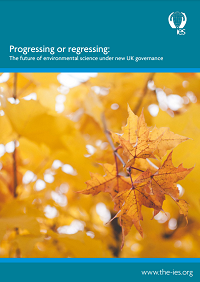Over the past 50 years, emerging environmental crises have made clear that the relationship between environmental governance, environmental science, and environmental outcomes is fundamental to creating the world that people wish to see. In the past decade, that relationship has been hollowed-out in the UK, leaving a chasm of uncertainty that divides society from many of the benefits that the environment can provide.
Since the UK voted to exit from the European Union in 2016, continuous efforts have been made by the UK Government to discover a new way to achieve environmental outcomes. The objective has been to establish a UK-specific regime that governs environmental policy, without regressing on the level of environmental standards provided.
The latest analysis from the IES provides a gap analysis on how much progress has been made towards replacing EU environmental governance systems with UK equivalents:
- Governance arrangements are in place to replace many of the functions of the EU’s governance system, though governance gaps remain, both in the letter of the law – where the extent of the European Commission’s level of authority is not replicated in the UK environmental governance – and in practice, where the regulatory capacity of UK oversight bodies and courts has not yet truly been tested;
- Most policies and proposals associated with the European Green Deal have corresponding policies in the UK, though the environmental standards associated with those policies are not universally equivalent;
- The Retained EU Law Act leaves considerable uncertainty around the future of environmental rules and regulations in the UK, posing the threat of regression in law, as well as regression in kind;
- Equivalent UK data is already collected (or could be extrapolated) for many of the indicators in the European Environmental Indicator Catalogue, however a considerable portion of the data is not consolidated in DEFRA’s Outcome Indicator Framework or the JNCC’s Biodiversity Indicators, leaving some noteworthy data gaps.
Many of these gaps have emerged not through malice or incompetence, but through the ‘hollowing-out’ of the science-policy interface, and the weakening of the relationship between science and society. Recent years have seen science become politicised as health and environmental policy decisions increasingly present challenges for securing social, economic, and environmental outcomes. To ensure a future where environmental governance is strong and people get the environmental outcomes they demand, we need a new approach, based on democratic reason which unites government, public, and scientific perspectives.
Over the next 50 years, science must be positioned to empower communities with the information to make positive choices about the future when they have the capacity to support change; it must be given the tools to supply evidence across the environment that prepares us for environmental challenges before they arise; and it must produce the professional guidance and standards needed to do so reliably and consistently.
By the end of the year, the IES will have published a thought-leading vision for the future of the environmental sciences, taking forward the evidence in this report and how the environment sector can contribute to that future. We will also have launched an Environmental Policy Implementation Community (EPIC) following our merger with Environmental Protection UK, which will serve as a leading example of the new interfaces we can develop between science, policy, and the public.
The stakes have never been higher for nature and the benefits it can provide. As we look to the future, the responsibility of modern environmental science must be to forge new communities to unite policy, the public, and the power of environmental science to use rigorous evidence to change the face of the natural world and what it means for the people who live in it.


